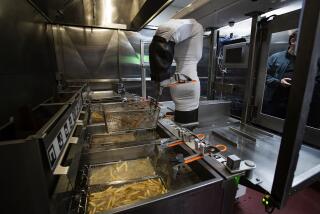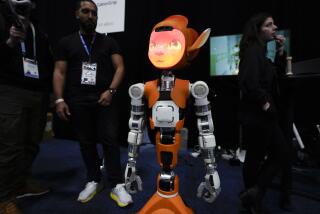Relax, Wage Slaves -- Robots Promise You an Endless Vacation
- Share via
Vacation is true freedom. It’s as close as we get to the “life, liberty and the pursuit of happiness” ideal of the Declaration of Independence.
What if you had that sort of freedom every day? We should be considering this possibility because we are now standing on the threshold of the robotic revolution. Primitive robots are already taking jobs all around us. The automated gas pumps and supermarket checkout lines are the leading edge of a robotic revolution in the workplace. And the revolution is about to accelerate rapidly.
Computer technology has been advancing steadily for the last 40 years, doubling speed and memory every 18 months in a process known as Moore’s Law. If you simply extrapolate these trends, you find that desktop computers will have capabilities equal to that of the human brain by 2040 or so. As computing power finally reaches parity with the human brain and then begins to exceed it, robots will become more and more human in terms of intelligence, visual recognition and language processing.
For many millenniums, Earth has been the home of a single intelligent species. Humans are now engineering the second one. It will take only a handful of breakthroughs to open the floodgates of the robotic revolution, and intelligent robots will directly compete with humans for jobs. As time passes, the new species will get better and better, cheaper and cheaper.
Robots will start performing every essential task in the 2040 time frame. They will grow, package and transport all of the food we eat. Robots will build all of the housing we live in. Robots will manufacture and sell all consumer products. In 1903, when the Wright brothers’ first rickety airplane took to the air, it was impossible to imagine that the B-52 bomber would be able to fly halfway around the world carrying 70,000 pounds of bombs just 50 year later. In the same way, it is impossible for us to imagine robots taking all the jobs in today’s economy in 2050. Yet they will. Robots in the workforce are as inevitable as jet aircraft were.
With robots doing the work, we should all be on perpetual vacation. Unfortunately, in the structure of our current economy, that is not what will happen.
We may see massive unemployment, with robots taking so many jobs that millions of unemployed humans end up in government welfare dormitories. Or perhaps we will create mundane new jobs to replace the old ones. The third option is the revolutionary one: What if we let the robots have the jobs, while we all attain actual economic freedom for the first time in human history?
To achieve true economic freedom, we must break a fundamental doctrine in today’s economy: the link between work and income. Robots will be doing all the work, so this link becomes meaningless. We need a new paradigm.
In the current paradigm, millions work to make the rich richer. For example, 3.5 million fast-food workers get minimum wage so executives can make billions of dollars collectively. We see that same formula throughout today’s economy. More and more money concentrates in the hands of the mega-rich.
With their wealth, the mega-rich buy candidates, lobbyists and lawyers to amass immense economic power. So chief executives’ salaries have risen by a factor of 10 since 1980. Dick Grasso, with his $140-million paycheck, is the most recent poster child for the phenomenon, but there are thousands of others: Ebbers, Anschutz, Gates, Case, etc. Meanwhile, the minimum wage has not changed since 1997, and workers’ wages are stagnant.
Robots will turbocharge this concentration process unless we stop it.
McDonald’s is already deploying order-taking kiosks and burger-flipping robots to thousands of restaurants. As this segment of the economy alone becomes robotic, it will leave 3 million fast-food workers unemployed while the corporate heads reap huge windfalls. The pattern will spread throughout our economy. Right now a large Wal-Mart store has 650 employees. A robotic Wal-Mart could drop that to 20 employees or less.
Instead of letting the mega-rich swim in an ocean of money created by robotic productivity, we should tap that ocean to provide a swimming pool of money for each person. Give everyone a generous stipend -- $25,000 or $30,000 per year, with the amount increasing along with robotic productivity. Let people live their lives in freedom while the robots do all the work.
The most common objection to this proposal is, “Without work, people will have nothing to do.” Here is the easiest rebuttal: If you, personally, received $25,000 per year, what would you do? If you are an artist, you would work on your art. If you are a writer, you would write. Inventors would invent, dancers would dance. Given true economic freedom, human creativity would explode.
We should redesign the economy to ignite this creative explosion. The new paradigm should give each human an equal portion of the robotic output and let everyone share the fruits of this new species. Robots give us all the chance to achieve true economic freedom. We, the People, should seize that opportunity.






